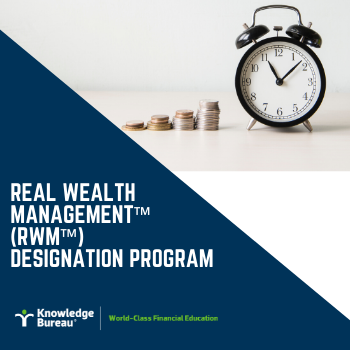Financial Independence – What Does it Really Mean?

Evelyn Jacks
The Sussexes and their quest for financial independence has been all over the global news. Their dilemma is not that uncommon to many couples their age. What does it take to embrace financial independence and why is that so critical in an individual’s true evolution into adulthood? It’s a question many financial advisors may find themselves discussing with affluent families across Canada.
It turns out that financial independence has several different contexts. For example, the study of Real Wealth Management at Knowledge Bureau asks advisors and their clients to start their financial decision-making by contemplating one simple question: how much is enough? People who have “enough” have true financial independence, and therefore have the freedom to do what they want with their time. In other words, they no longer have to worry about providing for basic wants and needs in either the short term or the long term.
How to get there is underscored in an excellent article from Sarah Newcomb, for Morningstar. In “A Simple Plan for Financial Independence,” the author writes, “Financial independence means being master of your own time.” She goes on to outline the three ways to produce income: land, labour and capital. If you want to stop working to make income, you have to have the other two in place. Land produces income, resources, outputs, appreciation. Capital can be physical, intellectual or financial. These three financial foundations produce income streams of many kinds, which in turn help to diversify away many kinds of risk, including tax risk.
Taxation must be factored into an understanding of financial independence and the availability of usable income and capital. It’s the net after-tax income that is available for spending now or  later (the role of savings). To that end, not all income sources are taxed alike. Interest, employment and pension income attract higher marginal tax rates than dividends and capital gains. Therefore, income diversification, stemming from a combination of labour, land and capital, bring better after-tax results, and that’s what matters: what you keep for consumption.
later (the role of savings). To that end, not all income sources are taxed alike. Interest, employment and pension income attract higher marginal tax rates than dividends and capital gains. Therefore, income diversification, stemming from a combination of labour, land and capital, bring better after-tax results, and that’s what matters: what you keep for consumption.
The tax system, in fact, has its own definition of financial independence. Someone dependent on a supporting individual, for example, generally has income below the Basic Personal Amount. That’s important to know if students wish to transfer the tuition fee amount to a supporting parent, grandparent or spouse. Furthermore, students are considered to be financial dependents by virtue of age for several provisions. When it comes to qualifying for CPP disability or survivor’s benefits, age 18-24 is considered, for example. This also applies to some of the Tax on Split Income (TOSI) rules, which attack income splitting with non-active family members of certain private corporations, specifically target distributions to those young adults attending post-secondary school.
It appears that this may be counter-productive to the goal of fostering financial independence. In a 2014 study, Factors Associated with Financial Independence in Young Adults, it was found that “parental income, asset, stock ownership and financial assistance has a negative effect on young adults’ (age 18-23) perceived financial independence.” On the other hand, financial independence of college graduates was higher than non-graduates. When it comes to financial independence, it seems the best thing affluent parents can give their children is the opportunity for a great education.
Ultimately, financial dependence can lead to a crisis: a sense that you have no control over your own life or time, as appears to be the case for the famous couple in the throes of great change on the world stage. It won’t likely be easy for them in the private world. Their journey will undoubtedly involve the management of land, labour and capital, some of which is already well established for them. But there will be new circumstances to contend with in making financial decisions, including the fact that Canadian residency comes with a requirement to report worldwide income and the value of assets abroad. This will likely have a bearing on how much time they spend in Canada.
Like other young affluent families, the Sussexes will need the advice of astute financial advisors with deep and broad financial knowledge they can trust.
Additional Educational Resources: Help clients on their quest to financial independence as a Real Wealth Manager™ and learn more about taxation issues that occur while living abroad in the Cross Border Taxation certificate course.
COPYRIGHT OWNED BY KNOWLEDGE BUREAU INC., 2020.
UNAUTHORIZED REPRODUCTION, IN WHOLE OR IN PART, IS PROHIBITED.